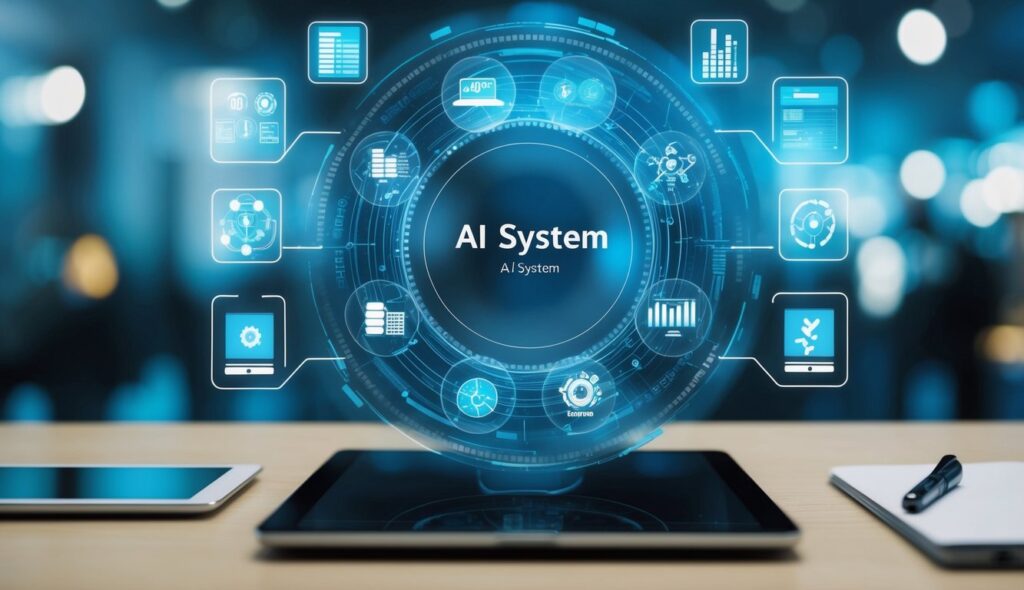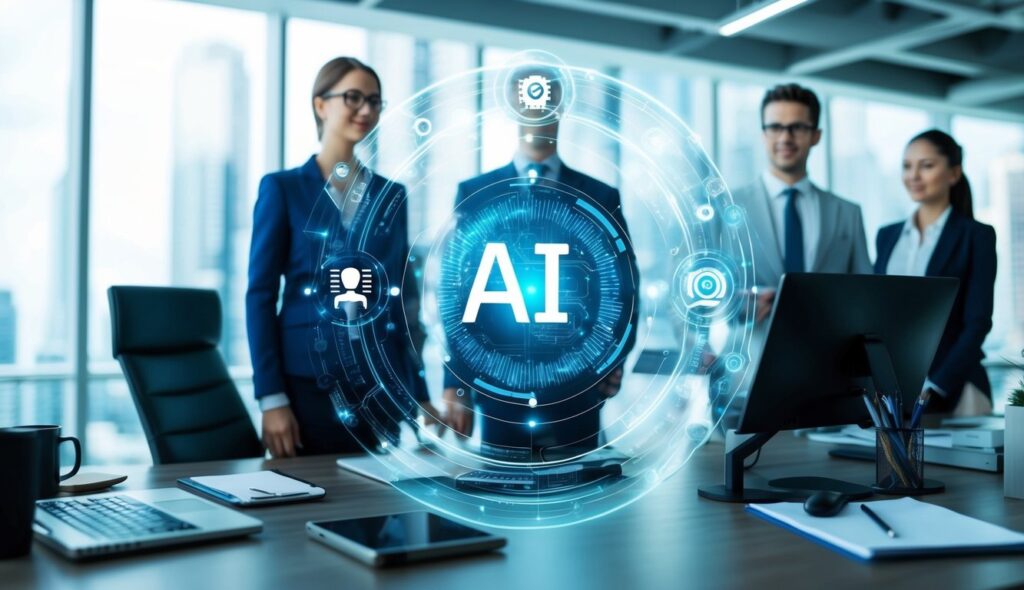Artificial Intelligence is revolutionizing the entrepreneurial landscape, transforming how business decisions are made and opportunities are identified. AI-powered tools are increasingly capable of analyzing vast amounts of data, providing insights that were previously unattainable. This technological shift is enabling entrepreneurs to make more informed choices and respond swiftly to market changes.
AI-driven decision making is set to become a cornerstone of successful entrepreneurship, offering a competitive edge through enhanced efficiency and accuracy. AI-powered tools can aid in evaluating strategic options, going beyond traditional data-driven approaches to provide deeper insights. This advancement is particularly crucial in a world where global competition is intensifying due to equal access to transformative technologies.
As AI continues to evolve, it will likely reshape various aspects of entrepreneurship, from automating routine tasks to identifying new market opportunities. Entrepreneurs who embrace AI technologies may find themselves better equipped to navigate the complexities of modern business environments and drive innovation in their respective fields.
Key Takeaways
- AI enhances entrepreneurial decision-making by providing deeper insights from complex data analysis
- The integration of AI in business processes is increasing global competition and driving innovation
- Embracing AI technologies can give entrepreneurs a competitive advantage in identifying opportunities and streamlining operations
The Role of AI in Entrepreneurial Decision-Making
Artificial intelligence is transforming how entrepreneurs identify opportunities and make strategic choices. AI tools provide data-driven insights to inform key business decisions and uncover promising market openings.
Understanding AI Capabilities
AI systems can process vast amounts of data to detect patterns and generate predictions. This allows entrepreneurs to make more informed decisions by analyzing complex market trends, customer behaviors, and competitive landscapes.
Machine learning algorithms continuously improve their accuracy as they are exposed to more data. This enables AI to offer increasingly sophisticated recommendations over time.
Natural language processing gives AI the ability to understand and generate human language. Entrepreneurs can use this to analyze customer feedback, social media sentiment, and other unstructured data sources.
Computer vision allows AI to extract insights from images and video. This opens up new possibilities for market research and product development.
AI and Predictive Analytics in Opportunity Identification
Predictive analytics powered by AI helps entrepreneurs identify promising business opportunities before they become obvious to competitors. By analyzing historical data and current trends, AI can forecast future market demands and consumer preferences.
AI tools can evaluate the potential of new product ideas by simulating market responses and predicting sales performance. This reduces the risk of launching unsuccessful offerings.
Machine learning models can segment customers into precise groups based on behavior patterns. This allows entrepreneurs to tailor their products and marketing strategies to specific audience needs.
AI-driven competitive intelligence tools monitor rivals’ activities and predict their next moves. Entrepreneurs can use these insights to differentiate their offerings and stay ahead of market shifts.
Enhancing Business Productivity with AI

Artificial intelligence is revolutionizing how businesses operate, boosting productivity through automation and data-driven optimization. AI tools enable companies to work smarter and faster, freeing up human resources for higher-value tasks.
Streamlining Operations through Automation
AI-powered automation is transforming business operations across industries. Robotic process automation (RPA) handles repetitive tasks with speed and accuracy, reducing errors and costs.
AI chatbots provide 24/7 customer support, answering queries and resolving issues without human intervention. This improves response times and customer satisfaction.
In manufacturing, AI-enabled predictive maintenance prevents costly breakdowns, optimizing equipment uptime and productivity. Smart inventory management systems use AI to forecast demand and automate restocking.
AI also streamlines administrative tasks like scheduling, data entry, and report generation. This allows employees to focus on strategic work that drives business growth.
Optimizing Performance with Machine Learning
Machine learning algorithms analyze vast amounts of data to uncover insights and optimize business performance. AI-driven analytics tools identify trends, patterns, and anomalies faster than humans can.
In marketing, AI optimizes ad targeting and personalization, improving campaign ROI. Machine learning models predict customer behavior and preferences, enabling businesses to tailor their offerings.
AI enhances decision-making processes by providing data-backed recommendations. This leads to more informed strategies and resource allocation.
Predictive analytics powered by AI forecasts market trends and demand fluctuations. This helps businesses adapt quickly to changing conditions and stay competitive.
AI Technologies Reshaping Business Growth

Artificial intelligence is transforming how entrepreneurs scale their businesses and reach customers. AI-powered tools are enabling more efficient operations and personalized marketing strategies.
The Impact of AI on Scaling and Selling
AI-driven decision making is revolutionizing how businesses scale and sell products. Machine learning algorithms can analyze vast datasets to optimize pricing, inventory management, and supply chain logistics.
AI chatbots and virtual assistants are improving customer service while reducing costs. These tools can handle routine inquiries 24/7, freeing up human staff for more complex issues.
Predictive analytics powered by AI help businesses forecast demand more accurately. This allows for better resource allocation and reduced waste.
AI technologies like computer vision are enhancing quality control in manufacturing. Automated systems can spot defects faster and more reliably than human inspectors.
Marketing in the Age of AI
AI is reshaping digital marketing strategies for entrepreneurs. Machine learning algorithms can analyze consumer behavior to deliver highly targeted advertisements.
Natural language processing enables AI to generate personalized content at scale. This includes product descriptions, email campaigns, and social media posts tailored to specific audience segments.
AI-powered recommendation engines help businesses increase sales through personalized product suggestions. These systems analyze past purchases and browsing behavior to predict customer preferences.
Deep learning models can process visual data to optimize ad creative and placement. This includes analyzing which images and videos perform best for different audience segments.
Challenges and Limitations of AI in Entrepreneurship

Integrating AI into entrepreneurial ventures presents significant hurdles. Entrepreneurs face difficulties in acquiring necessary skills and managing risks associated with AI implementation.
Addressing the AI Skills Gap
Entrepreneurs often lack the technical expertise required to effectively leverage AI technologies. This skills gap can hinder the adoption and optimal use of AI in business operations.
Training programs and partnerships with AI experts become crucial for bridging this gap. Entrepreneurs may need to invest in upskilling their workforce or hire specialized talent.
Continuous learning is essential, as AI technologies evolve rapidly. Staying updated with the latest advancements in machine learning, natural language processing, and data analysis is challenging but necessary.
Mitigating Risks of AI Implementation
AI implementation carries inherent risks that entrepreneurs must carefully navigate. Data privacy and security concerns are paramount, especially when handling sensitive customer information.
Ethical considerations arise in AI-driven decision making. Bias in algorithms can lead to unfair or discriminatory outcomes, potentially damaging a company’s reputation and legal standing.
AI systems may make errors or produce unexpected results, impacting critical business decisions. Entrepreneurs must implement robust testing and monitoring processes to ensure AI reliability.
Regulatory compliance poses another challenge. As AI regulations evolve, entrepreneurs must stay informed and adapt their AI strategies accordingly to avoid legal issues.
AI-Driven Innovation in Startup Ecosystems

Artificial intelligence is reshaping how startups innovate and grow. AI tools empower entrepreneurs to make data-driven decisions and develop cutting-edge products. Collaboration between startups and AI companies is accelerating the pace of innovation across industries.
Fostering Entrepreneurship with AI Tools
AI enables startups to analyze vast amounts of data quickly, leading to more informed strategic decisions. Machine learning algorithms can identify market trends and consumer preferences, helping entrepreneurs spot opportunities.
Natural language processing allows startups to gain insights from customer feedback at scale. Computer vision and robotics technologies open up new possibilities for product development and automation.
AI-powered tools assist with tasks like financial forecasting, inventory management, and customer segmentation. This allows small teams to operate more efficiently and compete with larger companies.
In emerging economies, AI is helping startups overcome infrastructure challenges. Mobile AI applications provide access to services in underserved areas, fostering economic growth.
Collaboration between Startups and AI
Partnerships between AI companies and startups create symbiotic relationships that drive innovation. Startups gain access to cutting-edge AI capabilities, while AI firms benefit from real-world applications of their technology.
AI accelerators and incubators provide mentorship, funding, and resources to AI-focused startups. These programs help entrepreneurs refine their ideas and bring AI-powered products to market faster.
Open-source AI tools and platforms allow startups to build on existing technologies. This collaborative approach accelerates development cycles and reduces costs for resource-constrained companies.
Cross-industry collaborations are emerging, with AI startups partnering across sectors like healthcare, finance, and manufacturing. These partnerships lead to novel solutions that address complex challenges.
Future Trends in AI and Entrepreneurship

AI is reshaping entrepreneurship by revolutionizing decision-making processes and market dynamics. Entrepreneurs are leveraging AI to gain competitive advantages and navigate complex economic landscapes.
AI and the Evolving Market Landscape
AI is transforming how entrepreneurs approach market opportunities. Machine learning algorithms are enabling more sophisticated analysis of consumer behavior and market trends. This allows businesses to identify niche markets and personalize offerings with unprecedented precision.
The Internet of Things (IoT) and Industry 4.0 are creating new entrepreneurial opportunities. AI-powered systems can optimize supply chains, predict maintenance needs, and enhance product development cycles. This integration is driving the Fourth Industrial Revolution, where smart factories and autonomous systems become the norm.
By 2030, AI is expected to significantly alter the competitive landscape. Entrepreneurs who harness AI effectively will be better positioned to scale rapidly and disrupt established industries. However, this also means increased global competition, as AI tools become widely accessible.
Predicting Economic Shifts with AI
AI’s predictive capabilities are becoming invaluable for entrepreneurs navigating economic uncertainties. Advanced algorithms can analyze vast amounts of data to forecast market trends, consumer demand, and potential economic downturns.
This predictive power enables entrepreneurs to:
- Anticipate shifts in consumer preferences
- Identify emerging markets before they mature
- Optimize pricing strategies in real-time
- Adjust business models proactively
AI-driven economic forecasting is particularly crucial in volatile markets. Entrepreneurs can use these insights to make more informed decisions about investments, expansions, and pivots. As AI models become more sophisticated, their ability to predict complex economic patterns will likely improve, giving AI-savvy entrepreneurs a significant edge.
AI’s Societal Impact and Entrepreneurial Opportunities

Artificial intelligence is reshaping society and creating new entrepreneurial pathways. It presents both challenges and opportunities for the workforce, while also holding potential to address inequalities through innovative applications.
AI and Future of Work
AI technologies are transforming the job market, leading to shifts in required skills and job roles. Some positions may become obsolete, while new ones emerge. Entrepreneurs are finding opportunities to develop AI-powered tools that enhance productivity and decision-making capabilities.
These innovations are changing how businesses operate, creating demand for AI integration services and consulting. Workers increasingly need to develop AI literacy and adaptability to remain competitive.
AI’s impact extends beyond job displacement. It’s augmenting human capabilities, allowing for more strategic and creative work. This shift presents entrepreneurs with chances to create training programs and educational products that help workers transition to AI-enhanced roles.
Creating Equitable Opportunities through AI
AI has the potential to address societal inequalities by providing access to resources and opportunities previously out of reach for many. Entrepreneurs are developing AI-driven platforms that offer personalized education, skills training, and job matching services to underserved communities.
These technologies can help level the playing field by reducing biases in hiring processes and providing equal access to information and services. AI-powered microfinance and credit scoring systems are enabling financial inclusion for those traditionally excluded from formal banking systems.
Social entrepreneurs are leveraging AI to tackle complex issues like healthcare disparities and environmental challenges. By analyzing vast amounts of data, AI helps identify patterns and solutions that can benefit marginalized populations and create more equitable societies.
Establishing a Framework for AI-Integrated Businesses

AI integration in business frameworks revolutionizes decision-making processes and operational efficiency. Companies that effectively implement AI technologies gain competitive advantages through data-driven insights and automated workflows.
Leveraging AI for Systematic Growth
AI-driven decision making enables businesses to achieve systematic growth by analyzing vast amounts of data and identifying strategic opportunities. Organizations can design AI-integrated frameworks that align with their business objectives and market positioning.
These frameworks often involve:
• Data collection and analysis systems
• Machine learning algorithms for predictive modeling
• AI-powered dashboards for real-time insights
Implementing such systems requires a shift in organizational design, with new roles and departments focused on AI management and data science. Institutions may need to adapt their structures to fully harness AI capabilities.
Digitalization plays a crucial role in this process, as businesses must ensure their data is accessible and usable by AI systems. This often involves:
- Upgrading legacy systems
- Implementing cloud-based solutions
- Developing APIs for data integration
AI in Operations and Supply Chain Management
AI technologies significantly enhance operations and supply chain management through automated processes and predictive analytics. Companies can use AI to optimize inventory levels, forecast demand, and streamline logistics.
Key applications include:
• Automated quality control systems
• AI-powered demand forecasting
• Intelligent routing and scheduling for deliveries
These applications often require coding expertise to develop and maintain. Businesses may need to invest in training programs or hire specialized talent to support their AI initiatives.
AI-driven supply chain management can lead to:
- Reduced operational costs
- Improved customer satisfaction
- Enhanced resilience to market disruptions
By integrating AI into their operations, businesses can achieve greater efficiency and adaptability in an increasingly complex global marketplace.
Frequently Asked Questions

AI is rapidly transforming entrepreneurship through improved decision-making, strategic planning, and operational efficiency. It presents both challenges and opportunities for business leaders as they navigate an increasingly data-driven landscape.
How will AI impact the decision-making processes in upcoming entrepreneurial ventures?
AI is poised to revolutionize decision-making in entrepreneurial ventures. AI-driven decision making can evaluate strategic options using big data analytics, going beyond traditional data-driven approaches.
This allows entrepreneurs to make more informed choices based on complex pattern recognition and predictive modeling. AI systems can process vast amounts of information quickly, identifying trends and opportunities that humans might miss.
What challenges and opportunities does AI present for future business leaders?
AI presents significant opportunities for business leaders to enhance efficiency and gain competitive advantages. It enables rapid experimentation and iteration in product development and marketing strategies.
Challenges include the need for AI literacy and adaptation among entrepreneurs. Leaders must learn to effectively integrate AI tools into their workflows and understand their capabilities and limitations.
In what ways can AI-driven analytics enhance strategic planning in entrepreneurship?
AI-driven analytics can dramatically improve strategic planning by providing deeper insights into market trends, consumer behavior, and competitive landscapes. Entrepreneurs can leverage AI to analyze vast datasets and identify patterns that inform long-term strategy.
These tools enable more accurate forecasting and scenario planning, allowing entrepreneurs to anticipate market shifts and adapt their strategies proactively.
How do advancements in AI technology influence innovation and competitive strategy for entrepreneurs?
AI advancements are accelerating innovation cycles and reshaping competitive strategies. Entrepreneurs can use generative AI to quickly prototype ideas, create content, and develop new products or services.
This technology enables smaller companies to compete more effectively with larger firms by automating complex tasks and reducing the need for extensive human resources.
What role does AI play in the management of resources and operations in new businesses?
AI plays a crucial role in optimizing resource allocation and streamlining operations for new businesses. It can automate routine tasks, freeing up entrepreneurs to focus on strategic activities.
AI-powered tools can manage inventory, predict maintenance needs, and optimize supply chains. This leads to increased efficiency and reduced operational costs for startups.
How might AI transform the landscape of customer relationship management for entrepreneurs?
AI is revolutionizing customer relationship management by enabling personalized interactions at scale. Entrepreneurs can use AI-powered chatbots and virtual assistants to provide 24/7 customer support.
AI analysis of customer data helps entrepreneurs understand preferences and behavior patterns, allowing for highly targeted marketing and product recommendations.


